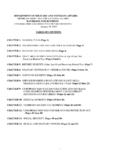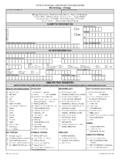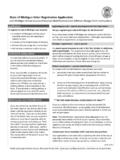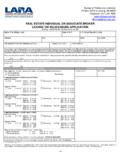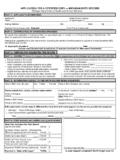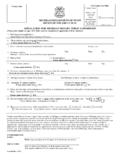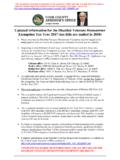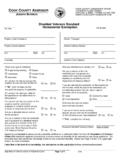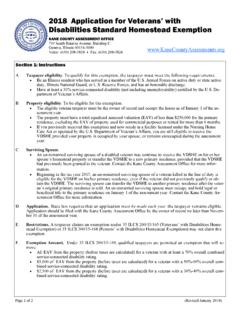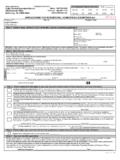Transcription of MCL 211.7b: Disabled Veterans Exemption ... - …
1 MCL : Disabled Veterans Exemption Frequently Asked Questions Prepared by the Michigan State Tax Commission February 2018 1 Table of Contents MCL Disabled Veteran s Exemption .. 2 Applying for the Exemption .. 3 Determining the Property which is Eligible for the Exemption .. 4 Unremarried surviving spouses .. 7 Eligibility Requirements .. 8 Changes in the Property s Status During the Year ..11 Other Questions and Answers ..12 2 MCL Disabled Veteran s Exemption Michigan 161 of 2013 amended MCL relating to the Exemption for Disabled Veterans . Specifically this Act changed MCL to read as follows: Sec. 7b. (1) Real property used and owned as a homestead by a Disabled veteran who was discharged from the armed forces of the United States under honorable conditions or by an individual described in subsection (2) is exempt from the collection of taxes under this act.
2 To obtain the Exemption , an affidavit showing the facts required by this section and a description of the real property shall be filed by the property owner or his or her legal designee with the supervisor or other assessing officer during the period beginning with the tax day for each year and ending at the time of the final adjournment of the local board of review. The affidavit when filed shall be open to inspection. The county treasurer shall cancel taxes subject to collection under this act for any year in which a Disabled veteran eligible for the Exemption under this section has acquired title to real property exempt under this section.
3 Upon granting the Exemption under this section, each local taxing unit shall bear the loss of its portion of the taxes upon which the Exemption has been granted. (2) If a Disabled veteran who is otherwise eligible for the Exemption under this section dies, either before or after the Exemption under this section is granted, the Exemption shall remain available to or shall continue for his or her unremarried surviving spouse. The surviving spouse shall comply with the requirements of subsection (1) and shall indicate on the affidavit that he or she is the surviving spouse of a Disabled veteran entitled to the Exemption under this section.
4 The Exemption shall continue as long as the surviving spouse remains unremarried. (3) As used in this section, Disabled veteran means a person who is a resident of this state and who meets 1 of the following criteria: (a) Has been determined by the United States department of Veterans affairs to be permanently and totally Disabled as a result of military service and entitled to Veterans benefits at the 100% rate. (b) Has a certificate from the United States Veterans administration, or its successors, certifying that he or she is receiving or has received pecuniary assistance due to disability for specially adapted housing.
5 (c) Has been rated by the United States department of Veterans affairs as individually unemployable. 3 Applying for the Exemption : In order to apply for the Exemption , the Disabled veteran, their unremarried surviving spouse or their legal designee must annually file an affidavit with the local unit where the property is located. The State Tax Commission has adopted Form 5107, Affidavit for Disabled Veterans Exemption as a sample application. The application process requires that the veteran must file both the affidavit and supporting evidence with the local city or township assessor annually.
6 When possible, this submission should be made in the first two months of the assessment year (January or February). If the submission is made later, the veteran or unremarried surviving spouse will receive a tax billing statement and the local unit s administrative costs are increased. Further, if it is determined that the submission is incomplete, the Exemption may be jeopardized. The March, July and December Boards of Review have authority to review and grant the Disabled Veterans Exemption . The sentence during the period beginning with the tax day for each year and ending at the time of the final adjournment of the local board of review has been interpreted by the State Tax Commission to mean the March, July and December Boards of Review all have authority to grant this Exemption .
7 Taxpayers should contact the local unit to determine the last day they will accept applications to present to the December Board of Review. If the Exemption is granted by the July or December Board of Review does it eliminate all the property taxes for that year? Yes. If the Exemption is granted by the December Board of Review then refunds would be issued for the taxes paid in September and no taxes would be due on the property in February of the following year. What is the authority of the Board of Review in granting an Exemption for a prior assessment year? The Board of Review only has the authority to grant a Disabled Veteran s Exemption for the year in which it is meeting.
8 I escrow my taxes, how do I get my refund? Taxpayers are advised to contact their mortgage company or bank to discuss this matter. If the veteran or surviving spouse purchased the home in September, what abatement of taxes is he or she eligible to receive? Disabled Veterans or their eligible unremarried surviving spouse who purchased their home mid-year are eligible for a partial refund of the current year s summer and winter taxes they have paid for that year or an Exemption from taxes they will pay for that year. Taxpayers are encouraged to provide the local city or township with a copy of the closing documents from the purchase of their home to assist the local unit in determining their property tax obligations.
9 4 What if the taxpayer is unable or unwilling to provide a closing statement when they sell or purchase a home? How is the Exemption calculated? In the absence of relevant information contained in the closing documents, the STC advises assessors to divide the total taxes for the year by 12 and then multiply that number by the number of months the veteran will own the home and use it as their homestead or divide the total taxes for the year by 365 and then multiply that number by the number of days the veteran will own the home and use it as their homestead If the veteran, who has owned and lived in their home for the full year, receives notification in August that they are 100% totally and permanently Disabled or individually unemployable or have been granted pecuniary assistance?
10 Do they receive the Exemption for the full year? The State Tax Commission recommends the Exemption be granted for the full year. Are special assessments eliminated as well? Special assessments are not considered property taxes. MCL specifically indicates that the property is exempt from the collection of taxes under the General Property Tax Act. Therefore, if an Exemption is granted under MCL , a special assessment would not generally be eliminated and would still be required to be paid. However, there is at least one special assessment statute, Michigan PA 33 of 1951, which is a millage based special assessment and provides funding for police and fire protection services.
